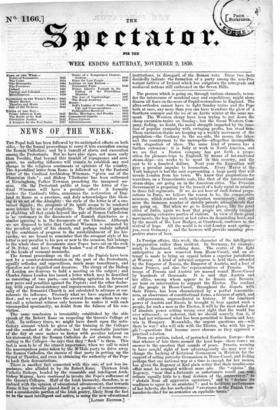NEWS OF THE WEEK.
THE Papal bull has been followed by its anticipated effects on both sides —by the formal proceedings to carry it into execution among the sides,—by Catholics ; and by a tumult of alarm and execration among the Protestants. But we have alio signs, not more early than forcible, that beyond this tumult repugnance and arro- gance, no enduring influence will remain, to establish any real change in the religious sentiments or opinions of the country. The Apostolieal letter from Rome is followed up by"the Pastoral letter of the Cardinal Archbishop Wiseman, " given out of the Flaininian Gate " •, and Bishop Ullathorne 'has been enthroned at Birminghanl, Father Newman preaching the inaugural ser- mon. On the Protestant public at large the letter of Car- dinal Wiseman will have a peculiar effect : it formally recites the Cardinal's titles, announces the restoration of Eng- land to Rome as a province, and duly acknowledges• this bless- ing as-an.aet pf the Almighty : the style of the letter is of a sus- tained dignity; the arrogance of its spirit seems to be rendered more intense by an air of simplicity. The affectation of ignoring or slighting all that exists beyond the pale of Roman Catholicism is as 'customary in the documents of Romish dignitaries as a similar ignoring is in the documents of the Chinese. Although we are disposed to infer that Cardinal Wiseman is animated by the proudest spirit of his church, and perhaps unduly inflated by the semblance of progress in the restablishment of his hie- rarchy, we are bound to remember that the arrogant style of his letter is not peculiar to his pen or new to the occasion, but belongs to the whole class of documents since Popes have sat on the rock of St. Peter and have flung the leaden " seal of the Fisherman" at the heads of recusant monarchs.
The formal proceedings on the part of the Papists have been met by a counter-demonstration on the part of the Protestants, equally orthodox and supercilious, much more tumultuary, and therefore not so dignified and decorous. The clergy of the Bishop of London are desirous to hold a meeting on the subject ; and Charles James London has issued a letter which may, be described as consisting of two parts,—one abetting agitation in favour of new pains and penalties against the Papists ; and the other declar- ing, with equal inconsistency and ingenuousness, that the present sally of the Romanist Church is not calculated to advance or cor- roborate its influence. Precisely, what we have argued from the first ; and we are glad to have the avowal from one whom we can- not call a reluctant witness only because he makes it with such uncompelled spontaneity, no doubt from the fulness of his con- viction.
The same conclusion is irresistibly. established by the able speech of Sir Robert Kane on reopening the Queen's College at Cork. In ordinary times, we might have dwelt upon the satis- factory account which he gives of the training in the Colleges and the conduct of the students ; but the remarkable juncture of the day at once makes us fasten with peculiar interest on his statement, that the Roman Catholics do not abstain from re- sorting to the Colleges—he says that they " flock " to them. This fact is seen to be of the utmost importance, when we call to mind the unscrupulous pains taken by the M‘Hale party to drive away the Roman Cathohcs, the success of that party in getting up the Synod at Thurles, and even in obtaining the authority of the Pope to back their denunciations.
_There is another fact connected with this one, of not less im- portance, also alluded to by Sir Robert Kane. Thirteen Irish Catholic Bishops, headed by the venerable and intelligent Arch- bishop Murray, have continued to invoke the Pope's sufferance of the Queen's Colleges. Half of the Irish hierarchy, therefore, is so imbued with the opinion of educational advancement, that towards Rome it has virtually placed itself in a position of remonstrance ; and a considerable portion of the Irish gentry, likely from the fact to be the most intelligent and active, is using the new educational
institutions, in disregard of the Roman veto. These two facts decidedly indicate the formation of a party among the non-Pro- testant natives of Ireland which has outgrown the retrograde and mediaeval notions still enthroned on the Seven Hills.


























